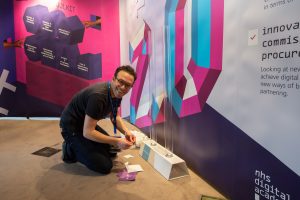By Rachel Dunscombe, CEO, NHS Digital Academy
 Standing in the Royal Society on the 16th of April waiting for the participants to arrive was both surreal and exciting. Surreal because of the rapid journey our wonderful team had taken to make the programme happen – this had become a reality so quickly. Exciting because I couldn’t wait to get started – this programme is important for the system and for me something I am hugely committed to.
Standing in the Royal Society on the 16th of April waiting for the participants to arrive was both surreal and exciting. Surreal because of the rapid journey our wonderful team had taken to make the programme happen – this had become a reality so quickly. Exciting because I couldn’t wait to get started – this programme is important for the system and for me something I am hugely committed to.
The Digital Academy operational team, of which I am a part, are all keen to ensure that this programme is as grounded in digital leaders’ practice as much as possible rather than being too high end academic. It is a difficult juggling act given that folk will be coming away with a postgraduate diploma from Imperial College London. We worked hard to strike this balance in the run up to the first three day residential.
I set the tone for day one by conducting a poll of the audience. We found out who was in the room and that out of 104 participants there were 53 doctors – the majority by a long way. I do question why more people from other professional groups didn’t apply for the first programme? It would be great to see more nurses, for example, applying for future cohorts given that they represent the majority of the workforce. That said, we do have six nurses on the current cohort along with four pharmacists, a dentist and a social care digital specialist.
Everyone was super enthusiastic and really got stuck in to the icebreaker session. We immediately started to find common ground and get motivated about being a huge movement of like-minded digital leaders. #digitalleaders soon began trending on Twitter followed later by #cohort1.

Designing the space for learning was a key part of the first residential and I am lucky to have the talented Lenny Naar working with me from the Helix Centre. Lenny is very passionate about creating learning environments that are engaging, modern and different. He has developed a brand for the Digital Academy that is certainly unique and captures the Zeitgeist of our work. Each of the module leads bottled this creative flair to introduce their module content by using large interactive galleries which participants walked around. As module 2 lead, (I wear a variety of hats on the programme) I had my chance to facilitate some discussions using this creative approach. I really enjoyed getting stuck in and am very proud of the content that myself and my other co-developers have created.
Day one finished with population health games involving a competition to throw paper planes and a chance to laugh at those wearing zany specs playing ‘Deal or No Deal’. You had to be there, I think, although there are a few photographs floating around on Twitter – learning can be fun.
Day two had a very different vibe as we all travelled to the Royal College of GPs for a joint day with the SQIL programme, delivered by Harvard Medical School. The stand-out sessions were definitely the negotiation exercise and the panel discussion. We all learnt that sticking to your position for dear life in a negotiation session, is less than ideal, and that actively listening and understanding different perspectives is crucial to being successful. The panel session with Lord Ara Darzi, Matthew Swindells and Sir David Sloman was incredibly powerful. I do appreciate it when panel members can be so frank and open as it’s a refreshing change from the well towed lines we often hear.
Back to the Royal Society for an early start on day three meant that we had to summon up all our energy reserves to make the final day a success…and it was.
We heard about the central role that individual workplace projects play in the programme and got participants to articulate the main aim of theirs to their peer support group.
Bob Klaber from Imperial College NHS Healthcare Trust kept us stimulated by providing a practical way of looking at improvement methodology and illustrating this through the design and development of card towers. I am passionate about quality improvement and hope this is a theme that we will revisit again at different points in the programme. Many of the wonderful participants talked about this session being a real lightbulb moment for them – Bob truly embodies quality improvement work.
I did worry that energy levels would dip towards the end of the third day. However, you could hear a pin drop during the final session when Liz O’Riordan challenged us to think like a patient. This session was so well delivered that everyone left feeling motivated to try harder – after all, any one of us could end up being on the receiving end as a patient. As clinicians and NHS staff we think we know what it is like for patients? Think again!
I am proud of what my programme team have delivered and feel privileged to be working with such a great bunch of people who go the extra mile, rolling their sleeves up, doing whatever it takes to make the NHS Digital Academy programme a great success. This is only the start of the journey as now participants have to begin their online learning path. However, if the first residential is anything to go by, then we can be very proud of the legacy we are creating.
For more information about the Digital Academy, visit the website.